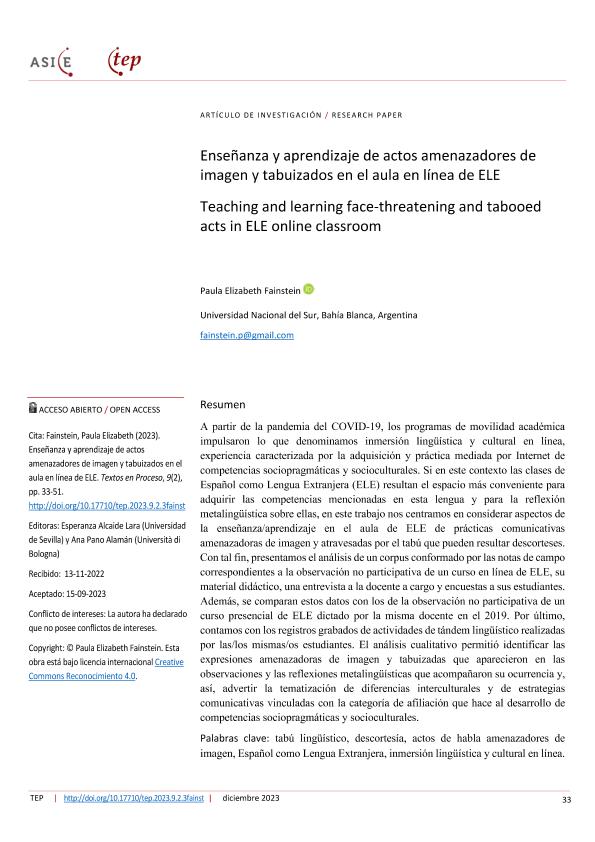Mostrar el registro sencillo del ítem
dc.contributor.author
Fainstein, Paula Elizabeth

dc.date.available
2024-02-05T11:42:09Z
dc.date.issued
2023-12-30
dc.identifier.citation
Fainstein, Paula Elizabeth; Enseñanza y aprendizaje de actos amenazadores de imagen y tabuizados en el aula en línea de ELE; Asociación Internacional para los Estudios de la Comunicación en Español; Textos en Proceso; 9; 2; 30-12-2023; 33-51
dc.identifier.issn
2001-967X
dc.identifier.uri
http://hdl.handle.net/11336/225665
dc.description.abstract
A partir de la pandemia del COVID-19, los programas de movilidad académica impulsaron lo que denominamos inmersión lingüística y cultural en línea, experiencia caracterizada por la adquisición y práctica mediada por Internet de competencias sociopragmáticas y socioculturales. Si en este contexto las clases de Español como Lengua Extranjera (ELE) resultan el espacio más conveniente para adquirir las competencias mencionadas en esta lengua y para la reflexión metalingüística sobre ellas, en este trabajo nos centramos en considerar aspectos de la enseñanza/aprendizaje en el aula de ELE de prácticas comunicativas amenazadoras de imagen y atravesadas por el tabú que pueden resultar descorteses. Con tal fin, presentamos el análisis de un corpus conformado por las notas de campo correspondientes a la observación no participativa de un curso en línea de ELE, su material didáctico, una entrevista a la docente a cargo y encuestas a sus estudiantes. Además, se comparan estos datos con los de la observación no participativa de un curso presencial de ELE dictado por la misma docente en el 2019. Por último, contamos con los registros grabados de actividades de tándem lingüístico realizadas por las/los mismas/os estudiantes. El análisis cualitativo permitió identificar las expresiones amenazadoras de imagen y tabuizadas que aparecieron en las observaciones y las reflexiones metalingüísticas que acompañaron su ocurrencia y, así, advertir la tematización de diferencias interculturales y de estrategias comunicativas vinculadas con la categoría de afiliación que hace al desarrollo de competencias sociopragmáticas y socioculturales.
dc.description.abstract
Since the COVID-19 pandemic, academic mobility programs have promoted what we call online linguistic and cultural immersion, experience characterized by the Internet-mediated acquisition and practice of sociopragmatic and sociocultural competences. If in this context Spanish as a Foreign Language (ELE for its acronym in Spanish) classes are the most convenient space to acquire the aforementioned competences and for metalinguistic reflection on them, in this opportunity, we focus on the teaching/learning of face-threatening and tabooed communicative practices that can be impolite. For this purpose, we present the analysis of a corpus conformed by the field notes corresponding to the non-participatory observation of an ELE online course, its didactic material, an interview with the teacher in charge and surveys to her students. In addition, these data will be compared with those of the non-participatory observation of an on-site ELE course taught by the same teacher in 2019. Finally, we have records of linguistic tandem activities carried out by the same students. The qualitative analysis of the corpus made it possible to identify face-threatening and tabooed expressions that appeared in the observed courses and the metalinguistic reflections that accompanied their occurrence and, thus, to notice the thematization of intercultural differences and communicative strategies linked to the category of affiliation that makes the development of sociopragmatic and sociocultural competences.
dc.format
application/pdf
dc.language.iso
spa
dc.publisher
Asociación Internacional para los Estudios de la Comunicación en Español
dc.rights
info:eu-repo/semantics/openAccess
dc.rights.uri
https://creativecommons.org/licenses/by/2.5/ar/
dc.subject
TABÚ LINGÜÍSTICO
dc.subject
DESCORTESÍA
dc.subject
ACTOS DE HABLA AMENAZADORES DE IMAGEN
dc.subject
ESPAÑOL COMO LENGUA EXTRANJERA
dc.subject
INMERSIÓN LINGÜÍSTICA Y CULTURAL EN LÍNEA
dc.subject
COVID-19
dc.subject.classification
Lingüística

dc.subject.classification
Lengua y Literatura

dc.subject.classification
HUMANIDADES

dc.title
Enseñanza y aprendizaje de actos amenazadores de imagen y tabuizados en el aula en línea de ELE
dc.title
Teaching and learning face-threatening and tabooed acts in ELE online classroom
dc.type
info:eu-repo/semantics/article
dc.type
info:ar-repo/semantics/artículo
dc.type
info:eu-repo/semantics/publishedVersion
dc.date.updated
2024-01-31T13:21:38Z
dc.journal.volume
9
dc.journal.number
2
dc.journal.pagination
33-51
dc.journal.pais
Suecia

dc.journal.ciudad
Estocolmo
dc.description.fil
Fil: Fainstein, Paula Elizabeth. Consejo Nacional de Investigaciones Científicas y Técnicas. Centro Científico Tecnológico Conicet - Bahía Blanca; Argentina. Universidad Nacional del Sur. Departamento de Humanidades. Centro de Estudios Lingüísticos; Argentina
dc.journal.title
Textos en Proceso
dc.relation.alternativeid
info:eu-repo/semantics/altIdentifier/url/https://www.asice.se/index.php/tep/article/view/405
dc.relation.alternativeid
info:eu-repo/semantics/altIdentifier/doi/http://dx.doi.org/10.17710/tep.2023.9.2.3fainst
Archivos asociados
